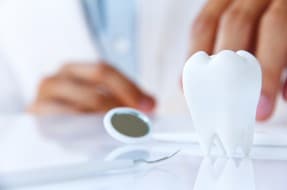Call now on0800 051 8069
Antibiotics for dental infections
-
The problems that can occur with overuse of antibiotics for dental infections and why a responsible approach to prescribing is urged.
The Faculty of General Dental Practice UK (FGDP UK) released a press release stating that dental practitioners should only consider the use of antibiotics when the drainage of an acute dental infection cannot be achieved.
USE OF ANTIBIOTICS FOR DENTAL INFECTIONS
Antibiotics kill bacteria and are used to combat many types of dental infections and antibiotics are sometimes routinely prescribed when a patient has an infection. However, Dr Nikolaus Palmer, FGDP (UK) Board member and Editor of the Faculty’s publication Antimicrobial Prescribing for General Dental Practitioners, believes that dental practitioners need to reflect carefully on their use of antibiotics. He says:
“The FGDP (UK)’s evidence-based guidance sets out sensible protocols for dental practitioners when considering the need to prescribe antimicrobials. Those that follow this guidance will already be aware that the majority of uncomplicated dental swellings can be successfully treated by removal of the source of the infection by drainage of the associated abscess. It is vital that dental practitioners recognise their role in helping to reduce the development of antimicrobial resistance.” [1]
It follows that dental practitioners have a duty to ensure that they offer patients the requisite treatment, rather than simply prescribing antibiotics. For instance, a dentist treating a patient who is suffering with a dental abscess should aim to drain the abscess rather than prescribing antibiotics.
Antibiotics for dental infections are usually only required if:
- There are signs that the infection is spreading, such as swelling of your face
- You have a weakened immune system
and in such circumstances are a necessary and effective form of treatment.
ANTIBIOTIC RESISTANCE
Overusing antibiotics for dental infections and prescribing them unnecessarily can lead to antibiotic resistance, where the antibiotics will no longer be effective and it becomes more difficult to treat an infection.
Antibiotic resistance can also be caused by the inappropriate use of the antibiotics that have been prescribed, such as:
- Failure to complete a course of antibiotics.
- Skipping doses.
- Not taking the antibiotics at regular intervals.
The FGDP (UK) describes antibiotic resistance as a worldwide problem and reports that Dentists working in the NHS in England prescribe nearly 10% of all oral antimicrobials in the primary care setting.
It is hoped that by following guidelines and adhering to providing treatment, antibiotic resistance can be reduced.
OUR EXPERIENCE
The Dental Negligence Team, see a number of cases where clients have been prescribed antibiotics for dental infections, but the treating dentist has failed to try and diagnose the cause of the problem and treat this appropriately. This can lead to a delay in a patient’s recovery, as the cause of the infection has not been treated and some may find they suffer repeat infections as a result.
If you or your family have concerns about whether you have been over prescribed antibiotics and suffered as a result, we would advise you to firstly seek advice from your dentist and/ or another dental professional.
It is also advisable to obtain advice from a specialist dental negligence solicitor, such as the lawyers in the Dental Negligence Team who specialise in dental negligence cases, who will be able to advise and consider whether the treatment has been performed negligently and whether you are entitled to compensation as a result.
[1] FGDP (UK) Press Release: 20 November 2013







